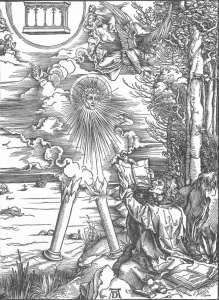The woodcut print at the end of this post is its apt punctuation. A part of a series of apocalyptic prints inspired by The Revelation of St. John, this one is called “St. John Devours the Book,” by Albrecht Durer, 1497-1498 AD.” What sense does it make to anyone?
Now: I wanted to add this link to a wonderful interview with president of the Santa Fe Institute David Krakauer, “Take me to the limit,” which appeared today on Science Radio Cafe. His careful explanations of myriad limits are fun, as much as they are useful for understanding the complexities of the universe and realizing what we can/cannot reasonably communicate about them.
His interview reminded me of a recent lecture I attended at Virginia Military Institute where Kelly Dean Jolley tackled Wittgenstein’s paradoxical puzzlement: “if a lion could speak, we could not understand him.” After a busy semester teaching rhetoric and composition, I could hardly stop and think about Jolley’s lecture, until today, and what a blessing to be able to spend added time listening to Krakauer tackle comparable communication breakdowns–when it comes to tackling limits!
Ah, this is the same with poetic expression, too! There are times when I come to a place where the language is just that: sensible nonsense. At those times, I know my poem doesn’t quite make sense, and so, while I can sense the experience, I simply cannot understand it, even when the words I use are mine. Yet, there is comfort in knowing that this communication breakdown is still a gateway for communicating an experience. Yes, poets can make no sense.
I will share one example, a poem I wrote in response to Winston’s mother’s suffering in George Orwell’s 1984, a novel which explores the limits of suffering:
The Immutability of Change
for Winston’s mother
What we have here, Winston,
Is tried terrain taken again
By another, and the mothers
Making do with a lick on the brink
Of what pours over and is lost:
Milk spills pursed lips;
Salt pours shorn shakers;
Water boils naked pails.
This is what I know
Of the immutability of change:
It is kept with the worm-worn crackers
And rolled between twice-boiled bones.
Here is another one, “Wainscot Rats,” published in Driftwood Press 2.2, pages 52-55, followed by an interview in which I share a bit about the terror of reading 1984 and the process I used to write “Wainscot Rats.” How can anyone approach that limit where an emergent apocalypse hinges on unimaginable catastrophes and suffering? How does a poet speak this clearly?
All together, I have fifteen of these Orwellian poems, all written in response to 1984 and energized by Kirsten Miles’ careful attention during a recent Tupelo 30/30 poetry project. Hopefully, over the summer, no matter how incommunicable, they will multiply into a book-length collection deserving of an audience!

